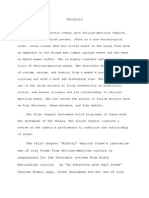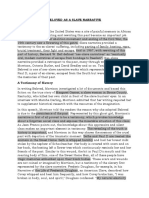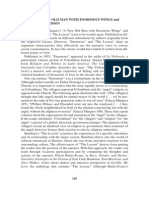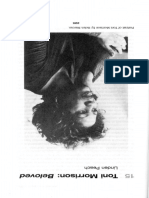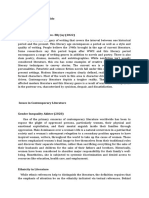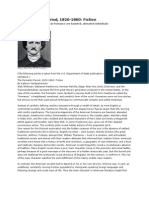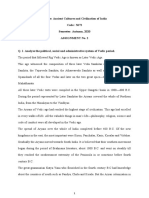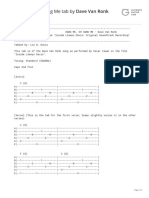Deflection of Personal Integrity in Mario Vargas Llosa's Conversation in The Cathedral and William Faulkner's The Sound and The Fury
Deflection of Personal Integrity in Mario Vargas Llosa's Conversation in The Cathedral and William Faulkner's The Sound and The Fury
Uploaded by
bathadCopyright:
Available Formats
Deflection of Personal Integrity in Mario Vargas Llosa's Conversation in The Cathedral and William Faulkner's The Sound and The Fury
Deflection of Personal Integrity in Mario Vargas Llosa's Conversation in The Cathedral and William Faulkner's The Sound and The Fury
Uploaded by
bathadOriginal Description:
Original Title
Copyright
Available Formats
Share this document
Did you find this document useful?
Is this content inappropriate?
Copyright:
Available Formats
Deflection of Personal Integrity in Mario Vargas Llosa's Conversation in The Cathedral and William Faulkner's The Sound and The Fury
Deflection of Personal Integrity in Mario Vargas Llosa's Conversation in The Cathedral and William Faulkner's The Sound and The Fury
Uploaded by
bathadCopyright:
Available Formats
IOSR Journal of Humanities and Social Science (IOSR-JHSS)
e-ISSN : 2279-0837, p-ISSN : 2279-0845
PP 68-71
www.iosrjournals.org
Deflection of Personal Integrity in Mario Vargas Llosa’s
Conversation in the Cathedral and William Faulkner’s the Sound
and the Fury
S. Trisha
Research Scholar (Ph.D), Department of English, Pachaiyappas College,Chennai – 30
Abstract: Mario Vargas Llosa is one of the most significant writers among the Latin American novelist and
essayist. Vargas Llosa belongs to the first generation of Latin American novelist to capture fully the attention of
an audience beyond their national borders. His novels can be considered as microcosms of Peruvian society. He
has used the mythical, popular and heroic elements in his texts to capture the social, political or cultural reality
of this country. William Faulkner is a seminal figure in modern American Literature. His works reflect the
distinct heritage of the American South. His novels mainly deal with the Civil War and reconstruction
devastated many of these once-great southern families economically, socially and psychologically. The novel
Conversation in the Cathedral by Mario Vargas Llosa and The Sound and the Fury by William Faulkner talks
about the depressed and disappointed characters because of the political strategy. The paper concentrates on
how the Civil War and the dictator rule make an individual to distract or compels him to distract from the moral
values.
Key words: faith, family,influence, society, politics
I. Introduction
Comparative literature deals with the literature of two or more different linguistic, cultural and nation groups.
Etymologically the term comparative literature denotes any literary work or works. It is the study of inter-
relationship between any two or more than two significant literary works or literatures. Bijay Kumar Dass
defines Comparative Literature as, “The simple way to define comparative literature is to say that it is a
comparison between the two literatures. Comparative literature analyses the similarities and dissimilarities and
parallels between two literatures. It further studies themes, modes, conventions and use of folk tales, myths in
two different literatures or even more”(Dass 1).
Comparative Literature is the study of literature that takes students beyond the borders of one particular country
and across time periods, languages and genres. It helps them to analyze and examine the literature around the
globe. Mario Vargas Llosa and William Faulkner are the most significant writers from the two different
continents. In their novels the writers deals with the problems in their society. Mario Vargas Llosa in his novels
brings out the effects of corruption in the country and the entire social world is also corrupted by it. William
Faulkner in his novels mainly deals with the Civil War and reconstruction devastated many of the once great
southern families economically, socially and psychologically.
Mario Vargas Llosa‟s novel Conversation in The Cathedral is an ambitious novel. An epigraph from Honore
de Balzac claims that the novel written by a true novelist represents, “the private history of nations”. Vargas
Llosa is presenting a “private history” of Peru. The novel Conversation in The Cathedral pictrizes the
Peruvian Society by describing Zavalita family, including the servants of the Zavalita household, Ambrosio and
Amalia. Santiago, the protagonist of the novel accidentally meets Ambrosio. They go to The Cathedral, a café
for poor people, to talk, to drink beer, and catch up on each other‟s activities.
In the very beginning of the novel the reader clearly learns that, the protagonist, is dissatisfied with his life,
believing that somewhere he has taken a wrong turn. Santiago‟s wealthy parent wants their son to succeed in
life. They hope he will go to the Catholic University favouring it over the state university, San Marcos like the
rest of the Lima bourgeoisie. Santiago who has lost faith and dislikes priest goes to San Marcos and soon joins a
Marxist discussion group. He becomes ashamed of his own family, although his father still treats him with great
consideration.
When the Marxist groups were arrested his father uses his political contacts and brings him out. After his release
Santiago leaves the University and goes to work for a newspaper, La Cronica, having broken completely with
his family. When Santiago breaks with his family he also breaks with politics. Ambrosio, Don Fermin‟s chauffer
becomes the chauffer of Don Cayo Bermudez, the Minister of Security. Don Fermin is acquainted with Don
Socio-Cultural Redemption in Comparative Literature 68 | Page
Sri Vasavi College, Self Finance Wing, Erode
Deflection of Personal Integrity in Mario Vargas Llosa’s Conversation in the Cathedral and William
Cayo who turns against him depriving him of government contracts. When Don Cayo loses his position he
leaves the country. His mistress, the prostitute Hortensia is murdered and the criminal is unknown. At the end of
his investigation Santiago finds the murderer but he realizes the truth was bound up by the wealthy
businessmen‟s power or by the political power.
The novel Conversation in The Cathedral is a narrative fiction which captures the corruption in Latin
America. It explores how individuals, communities and even an entire social world can be undermined by the
corrosive effects of corruption. David Gallangher in his seminal essay published in 1973 states that,
“Conversation is the culmination of Varga Llosa‟s literary explorations of Peru of the 1960s, in as much as it
finds its way to the proper formal structure and the proper language to offer a damning picture of a nation in
which every individual is compromised or corrupted in one way or another” (Gallangher 122-43).
Santiago is a complex and best developed character. When he ponders on the misery and degradation of Peru, he
feels that his own life was ruined. He abandons a life of privilege to reject the social milieu of his father.
Santiago‟s father Don Fermin gained his wealth and position from the shady business dealing with powerful
men from whom he gains political influence. He is actually a self-made man from the lower middle classes who
gained a measure of power through his willingness to participate in unlawful activities. Don Cayo, the brutal
head of a secret police, also climbed the social ladder through the use of ruthless force.
Santiago Zavala is an example of one of those university students unable to translate his contempt for the
capitalist system into anything other than a sense of personal frustration. Santigao is a conflicted individual who
does not know what to do about the human misery that surrounds him. Santiago has no doubts about the
problems that plague his country but he is agonised about solutions, “The worst thing was to leave doubts.
Clenching your fist, grinding your teeth, Ambrosio, APRA is the solution, religion is the solution, communism
is the solution, and believing it. Then life would become organized all by itself you wouldn‟t feel empty
anymore, Ambrosio” (CTC 99 -100).
The dialogue between Santiago and Ambrosio reflects their own and their country‟s predicament.
Santiago Zavala‟s muted tragedy a rejection of family and nation that justifies his decision to lead a mediocre
life is symptomatic of a corrupt social order. The following line clearly shows his situation, “He was like Peru,
he‟d screwed up somewhere along the line. He thinks: when? He thinks: there is no solution” (CTC 3). The lines
of Ambrosio also show his frustrated life: “He would work here and there and after that here and there, and then
well after that he would have died, wasn‟t that so, son?” (CTC 601).
The Sound and the Fury is the novel that establishes Faulkner's reputation as a permanent figure in
American literature. This novel is praised for its structure and for its penetrating examination of human
characters. The novel brings out the complex distinctions between past and present by employing
nonchronological narration, stream-of-consciousness techniques, and multiple points of view. This work
focuses upon the deterioration of the Compsons, a Mississippi family destroyed by lovelessness, selfishness, and
an obsession with lost southern nobility. According to Robert Griffin The Compsons are doomed by the curse
upon them, a curse of blood passed down through generations, expressing itself in feeble-mindedness, in sanity,
alcoholism and promiscuity and leading to the complete destruction of the family. They are also fated to
destruction through the pride in the Compson blood, their extreme awareness of the Compson name.
The Sound and the Fury is composed of four sections each with different narrators who relate the
events of a specific date in the Compon's history. The first section consists of a monologue by Benjy Compson,
a mentally retarded man whose mind at the age of thirty three is equivalent to that of a three-year-old child.
Although Benjy perceives his surroundings acutely and understands language, he remains locked in his own
solitary world, unable to speak, interpret his emotions, or understand the passage of time. In the opening of the
novel, he stands near a golf course that was once his favorite pasture, but was sold to pay for his sister Caddy's
wedding and for the first year of his brother Quentin's Harvard education. His mother rejects him when she
discovers Benjy is retarded. His name is also changed from Maury a family name to Benjy. His brothers,
Quentin and Jason, see him only as a burden and a source of shame.
In the second section of The Sound and the Fury Quentin narrates the events and turbulent emotions he
experiences on the day of his suicide. Like Benjy, he is immersed in a private world and recalls his childhood.
Benjy is unaware of temporal progression and hungers for affection, but Quentin is incapable of love and is
virtually paralyzed by his perception of time as a destructive force, he is obsessed with the past and the only
future he can imagine for himself is death. Quentin is obsessed with Caddy's sexuality, he associates her loss of
virginity to a brief lover by whom she becomes pregnant with the loss of southern nobility and pride. It has also
been suggested that Quentin's fixation on his sister stems from his own incestuous feelings and his longings to
reclaim the closeness they shared as children. Quentin refuses to accept Caddy's pregnancy and her subsequent
marriage to Herbert Head, whom she weds to conceal the illegitimacy of her pregnancy. David Minter
comments,
Socio-Cultural Redemption in Comparative Literature 69 | Page
Sri Vasavi College, Self Finance Wing, Erode
Deflection of Personal Integrity in Mario Vargas Llosa’s Conversation in the Cathedral and William
Quentin kills himself in part a punishment for his forbidden desires…. But he also kills himself because he fears
his own inconstancy. What he discovers in himself is deep psychological impotence. He is unable to play either
of the heroic roles; as seducer or as avenger----. What he fears is that he will ultimately fail, too, in the role of
the despairing lover. What he cannot abide is the prospect of a moment when caddy's corruption no longer
matters to him. (CLC 105)
The third section of the novel is narrated by Jason Compson, whose monologue has been variously described as
suspect, egocentric, and grimly satiric. Unlike Benjy, Quentin and Jason are caustic, avarice and harsh
rationalists. He is sharply opposite to Benjy's confused observation and Quentin's melancholy narrative. At the
time of his narrative, Caddy's husband had divorced her after discovering that her child is not his. Caddy sends
her illegitimate daughter, whom she has named Quentin in honour to her brother's memory, to live at the
Compson household. Acting as Miss Quentin's guardian Jason steal the money Caddy entrusts to him for the
child care. When Miss. Quentin receives a continuous verbal abuse from Jason, she gets angry and breaks into
his room, steals back her money as well as a considerable portion of his saving, and runs away.
The final section of the novel focuses on Dilsey, the Compson's black housekeeper. Dilsey's narration is
different from the three preceding monologues; it is an idea of a third-person, „A figure of strength, Christian
morality, and humanities decency‟. Dilsey encourages peace and order in the embittered Compson household.
This final part of narration occurs on Easter Sunday and ends with Dilsey taking Benjy to church with her.
Robert Griffin States: "Dilsey represents the 'old verities' of Christianity - not Christian rites or theological
dogma but the fundamental Christian ethic-forbearance and endurance and love and brotherhood”.
The first half of the nineteenth century saw the rise of a number of prominent Southern families such as
the Compsons. These families gave great importance to traditional Southern values. Courage, perseverance,
moral strength and chivalry are expected from men to maintain the honour of the family name. Women were
expected to be models of feminine purity, grace, and virginity until it came time for them to provide children to
inherit the family legacy. Faith in God and profound concern for preserving the family reputation provided the
grounding for these beliefs.
The warfare and Reconstruction desolated several of those once-great Southern families economically, socially,
and psychologically. William Faulkner contends that within the method, the Compsons, and different similar
Southern families, lost bit with the truth of the globe around them and have become lost during a haze of
preoccupation. This preoccupation corrupted the core values these families once unforsaken and left the newer
generations fully unequipped to wear down the realities of the fashionable world.
Mr. Compson has a vague notion of family honour, he passes something on to Quentin but is mired in his
alcoholism and maintains a fatalistic belief that he cannot control the events that befall his family. Mrs.
Compson is just as self-absorbed, wallowing in hypochondria and self-pity and remaining emotionally distant
from her children. Quentin‟s obsession with old Southern morality renders him paralyzed and unable to move
past his family‟s sins. Caddy tramples on the Southern notion of feminine purity and indulges in promiscuity, as
does her daughter. Jason wastes his cleverness on self-pity and greed, striving constantly for personal gain but
with no higher aspirations. Benjy commits no real sins, but the Compsons‟ decline is physically manifested
through his retardation and his inability to differentiate between morality and immorality.
The Compsons‟ corruption of Southern values results in a household that is completely devoid of love, the force
that once held the family together. Both parents are distant and ineffective. Caddy, the only child who shows an
ability to love, is eventually disowned. Though Quentin loves Caddy, his love is neurotic, obsessive, and
overprotective. None of the men experience any true romantic love, and are thus unable to marry and carry on
the family name.
At the conclusion of the novel, Dilsey is the only loving member of the household, the only character who
maintains her values without the corrupting influence of self-absorption. She thus comes to represent a hope for
the renewal of traditional Southern values in an uncorrupted and positive form. The novel ends with Dilsey as
the torchbearer for these values, and, as such, the only hope for the preservation of the Compson legacy.
Faulkner implies that the problem is not necessarily the values of the old South, but the fact that these values
were corrupted by families such as the Compsons and must be recaptured for any Southern greatness to return.
Corruption is a cancer, which every human being must strive to cure. Corruption spoils the image of
the individual, family, society and country. It may not be able to root out corruption completely at all levels but
it is possible to contain it within tolerable limits. It can only be eradicated only when an individual understands
and start to believe the values of ethics and morality in the life. Corruption is a global problem that all countries
of the world have to confront but the solutions to this problem come from the every individual of the society.
Socio-Cultural Redemption in Comparative Literature 70 | Page
Sri Vasavi College, Self Finance Wing, Erode
Deflection of Personal Integrity in Mario Vargas Llosa’s Conversation in the Cathedral and William
Works Cited:
Primary Sources:
[1] Vargas Llosa, Mario. Conversation in The Cathedral. New York: HarperCollins Publishers, 2005.
[2] Faulkner, William. The Sound and Fury. Delhi: Oxford University Press, 1981.
Secondary Sources:
[1] Bryfonski, Dedrida. ed. Contemporary Literary Criticism. Detroit: Gale Research Company, 1979.
[2] Gallagher, David. Mario Vargas Llosa „In Modern Latin American Literature. New York: Oxford University Press, 1973.
[3] Kristal, Efrain and King, John. ed. The Cambridge Companion to Mario Vargas Llosa. Cambridge: Cambridge University Press,
2012.
[4] Riley, Carolyn. ed. Contemporary Literary Criticism. Detroit: Gale Research Company, 1975.
[5] Riley, Carolyn and Mendelson, Phyllis Carmel. eds. Contemporary Literary Criticism. Detroit: Gale Research Company, 1976.
Socio-Cultural Redemption in Comparative Literature 71 | Page
Sri Vasavi College, Self Finance Wing, Erode
You might also like
- The Cariboo CafeDocument3 pagesThe Cariboo CafeMyriam GGo0% (1)
- Death in The AndesDocument6 pagesDeath in The AndesFjay-ar Advincula LlorcaNo ratings yet
- Conversation in The CathedralDocument2 pagesConversation in The CathedralARKA DATTA0% (1)
- MeatlessDocument115 pagesMeatlessZaheer Ahmed100% (4)
- Medieval Knights: Arming A KnightDocument4 pagesMedieval Knights: Arming A KnightReymund John TudtudNo ratings yet
- Convert HEIC To PNGDocument3 pagesConvert HEIC To PNGEjaz AlamNo ratings yet
- Award Ceremony SpeechDocument2 pagesAward Ceremony SpeechCarlos J. Armas N.No ratings yet
- Bad Girl-A Distorted Character With Dystopian Perspective'Document7 pagesBad Girl-A Distorted Character With Dystopian Perspective'eva.lynchNo ratings yet
- Research Paper On African American LiteratureDocument5 pagesResearch Paper On African American Literaturerpmvtcrif100% (1)
- Reclaiming Postcolonial Identity in Pramoedya Ananta Toer's "This Earth of Mankind" and Arundathi Roy's "The God of Small Things"Document10 pagesReclaiming Postcolonial Identity in Pramoedya Ananta Toer's "This Earth of Mankind" and Arundathi Roy's "The God of Small Things"Julia Alessandra TrinidadNo ratings yet
- SynopsisDocument15 pagesSynopsisrajamohanr78No ratings yet
- Issues and Challenges in Contemporary LiteratureDocument4 pagesIssues and Challenges in Contemporary LiteratureMa. Emely PondareNo ratings yet
- Race As in Chronicle of A Death ForetoldDocument6 pagesRace As in Chronicle of A Death Foretoldaishwaryamit99No ratings yet
- BELOVEDDocument6 pagesBELOVEDroonil wazlibNo ratings yet
- This Content Downloaded From 78.174.0.71 On Wed, 01 Jun 2022 19:32:56 UTCDocument20 pagesThis Content Downloaded From 78.174.0.71 On Wed, 01 Jun 2022 19:32:56 UTCanaiel nymviaNo ratings yet
- 21st Latin America and AfricaDocument9 pages21st Latin America and AfricaReo Klent AlawasNo ratings yet
- Sabers and Utopias: Visions of Latin America: EssaysFrom EverandSabers and Utopias: Visions of Latin America: EssaysRating: 4.5 out of 5 stars4.5/5 (4)
- A Universal PeruvianDocument2 pagesA Universal PeruvianJesus Castillo MoreNo ratings yet
- The Natures and Aftermath of The Social Cancer and Reign of GreedDocument3 pagesThe Natures and Aftermath of The Social Cancer and Reign of GreedSTORAGE FILENo ratings yet
- Rabindra Bharati University: UG3 SemesterDocument5 pagesRabindra Bharati University: UG3 SemesterTiyas MondalNo ratings yet
- 07 Chapter 01Document36 pages07 Chapter 01SohailRana100% (1)
- American Uncles and Aunts: Generations, Genealogies, Bildungs in 1930s NovelsDocument26 pagesAmerican Uncles and Aunts: Generations, Genealogies, Bildungs in 1930s NovelsCristián OpazoNo ratings yet
- Contemporary Literature by Maeann Audije and Enrico BiglaenDocument9 pagesContemporary Literature by Maeann Audije and Enrico BiglaenMenMen Rodriguez AudijeNo ratings yet
- Afro-American Women Writers ForDocument31 pagesAfro-American Women Writers ForKapil TomarNo ratings yet
- Zagadnienia Na Egzamin Licencjacki LiteraturoznawstwoDocument28 pagesZagadnienia Na Egzamin Licencjacki LiteraturoznawstwoMaciej IłendaNo ratings yet
- 1634 3880 2 PBDocument5 pages1634 3880 2 PBRishi PandeyNo ratings yet
- The Hand of The Enemey Final PaperDocument15 pagesThe Hand of The Enemey Final PaperChristian Vincent SabadoNo ratings yet
- Marquezs A Very Old Man With Enormous Wings and Bambaras The Lesson-LibreDocument4 pagesMarquezs A Very Old Man With Enormous Wings and Bambaras The Lesson-LibreJuhi NeogiNo ratings yet
- The Everydayness of Physical Brutality and Psychological Violence in Dambudzo Marechera S House of HungerDocument24 pagesThe Everydayness of Physical Brutality and Psychological Violence in Dambudzo Marechera S House of HungerTshidy LekweneNo ratings yet
- ErmitaDocument6 pagesErmitaMariel Ann Laureta RelotaNo ratings yet
- Issues PDFDocument33 pagesIssues PDFAngie CezarNo ratings yet
- Racial and Religious Hypocrisy in Adventures of Huckleberry FinnDocument17 pagesRacial and Religious Hypocrisy in Adventures of Huckleberry Finnsaqlain aNo ratings yet
- Review of LiteratureDocument45 pagesReview of LiteratureSanath KumarNo ratings yet
- Mario Vargas Llosa: Julia and The Scriptwriter, Published in 1977Document1 pageMario Vargas Llosa: Julia and The Scriptwriter, Published in 1977rcarxkNo ratings yet
- Toni Morrison - Beloved (Read in Context) 0001Document17 pagesToni Morrison - Beloved (Read in Context) 0001Malina Cindea100% (1)
- Mario Vargas Llosa: Julia and The Scriptwriter, Published in 1977Document2 pagesMario Vargas Llosa: Julia and The Scriptwriter, Published in 1977rcarxkNo ratings yet
- A Far Cry From AfricaDocument4 pagesA Far Cry From AfricaMay Wong50% (2)
- Gender Relations and Magical Realism in Zakes Mda's CionDocument35 pagesGender Relations and Magical Realism in Zakes Mda's CionNivin El AsdoudiNo ratings yet
- Issues and Challenges in Contem. LiteratureDocument3 pagesIssues and Challenges in Contem. LiteratureAngelica MancenidoNo ratings yet
- Asian African AmericanDocument20 pagesAsian African AmericanFadli YogaNo ratings yet
- Document 123456Document3 pagesDocument 123456habibNo ratings yet
- The Storyteller by Jodi Picoult: Conversation StartersFrom EverandThe Storyteller by Jodi Picoult: Conversation StartersNo ratings yet
- Anglo-American Literature Cross Atlantic 20th CenturyDocument32 pagesAnglo-American Literature Cross Atlantic 20th Centurycetinkaya.2122905No ratings yet
- A Shift in Literature: From Enlightenment To Romanticism: Buck 1Document9 pagesA Shift in Literature: From Enlightenment To Romanticism: Buck 1api-316566150No ratings yet
- The Quest of Racial Identity in Song of SolomonDocument41 pagesThe Quest of Racial Identity in Song of SolomonDonet M ThomasNo ratings yet
- The Afro American Novel (An Overview of 2000-2021)Document8 pagesThe Afro American Novel (An Overview of 2000-2021)yeah yeah oh ohNo ratings yet
- Wa0029.Document7 pagesWa0029.appsyparajuegosNo ratings yet
- Long-Distance Runner Dealt With The Themes of LonelinessDocument2 pagesLong-Distance Runner Dealt With The Themes of Lonelinessanon_59951004No ratings yet
- Gale Researcher Guide for: William Faulkner and the Modernist NovelFrom EverandGale Researcher Guide for: William Faulkner and the Modernist NovelNo ratings yet
- AmadoDocument24 pagesAmadoJuan DaboveNo ratings yet
- Universidad de Sevilla: "The Way You Wear Your Hat": Performativity and Self-Invention in Jackie Kay'sDocument10 pagesUniversidad de Sevilla: "The Way You Wear Your Hat": Performativity and Self-Invention in Jackie Kay'sJuan Angel CiarloNo ratings yet
- Literary Analysis Pat MoraDocument7 pagesLiterary Analysis Pat Moraapi-610906197No ratings yet
- Contemporary American Fiction Essay FinalDocument14 pagesContemporary American Fiction Essay FinalJoan SerraNo ratings yet
- American History Chapter 4-10Document101 pagesAmerican History Chapter 4-10Achmad Pandu UtomoNo ratings yet
- Touchstones: Essays on Literature, Art, and PoliticsFrom EverandTouchstones: Essays on Literature, Art, and PoliticsRating: 3.5 out of 5 stars3.5/5 (1)
- Chaireti - Midterm1 Larsen - Thurman Dec. 2020Document4 pagesChaireti - Midterm1 Larsen - Thurman Dec. 2020maria854No ratings yet
- The Experience of Culture Clash in ToniDocument4 pagesThe Experience of Culture Clash in Tonijohnredemption225No ratings yet
- Week 2 TheoryDocument5 pagesWeek 2 TheoryÉvora DíazNo ratings yet
- Gender-Related Difference in The Slave Narratives of Harriet Jacobs and Frederick DouglassDocument22 pagesGender-Related Difference in The Slave Narratives of Harriet Jacobs and Frederick DouglassJacob LundquistNo ratings yet
- 0500 w09 QP 1Document4 pages0500 w09 QP 1Rana SidNo ratings yet
- The Dark Prophecy - ExcerptDocument3 pagesThe Dark Prophecy - ExcerptmsreeatNo ratings yet
- 2013 - Cisco Icons - 1 - 24 - 13Document41 pages2013 - Cisco Icons - 1 - 24 - 13Antony SebastianNo ratings yet
- Performance Award For KindergartenDocument1 pagePerformance Award For KindergartenAvelina Paguirigan Dionicio100% (3)
- V e D A SDocument35 pagesV e D A SVeraaryans 22100% (1)
- Course: Ancient Cultures and Civilization of India Code: 5672 Semester: Autumn, 2020 Assignment No. 2Document27 pagesCourse: Ancient Cultures and Civilization of India Code: 5672 Semester: Autumn, 2020 Assignment No. 2Nargis RasheedNo ratings yet
- R.O. Morris, Contrapunctal TecnhiqueDocument150 pagesR.O. Morris, Contrapunctal TecnhiquegiovanniNo ratings yet
- Student Orientation: Hope Christian AcademyDocument3 pagesStudent Orientation: Hope Christian AcademyRizza Joy Delarosa AntonioNo ratings yet
- How Did Major World Events Contribute To All Modern Writers Sharing A Sense of AlienationDocument4 pagesHow Did Major World Events Contribute To All Modern Writers Sharing A Sense of Alienationtama00018No ratings yet
- Channel Your English Beginners - Test Booklet Final Exam A. Listen To Four Short Conversations and Answer The Questions. Circle A, B or C. (8 Marks)Document4 pagesChannel Your English Beginners - Test Booklet Final Exam A. Listen To Four Short Conversations and Answer The Questions. Circle A, B or C. (8 Marks)Krisztián SimonNo ratings yet
- Mykonos - WikipediaDocument52 pagesMykonos - WikipediaTimyNo ratings yet
- 1 A Letter To GodDocument26 pages1 A Letter To GodNayana GowdaNo ratings yet
- Hang Me Oh Hang MeDocument3 pagesHang Me Oh Hang MejvalamalaNo ratings yet
- Cutwork Projects CMEDocument14 pagesCutwork Projects CMEMarittaKarmaNo ratings yet
- Rohan 20stevenson 20song 20writing 20documentDocument9 pagesRohan 20stevenson 20song 20writing 20documentSebastián MoragaNo ratings yet
- How To Become A ScreenwriterDocument4 pagesHow To Become A ScreenwriterColeen gaboyNo ratings yet
- Forming Questions: E.g.: Paul A Hamburger. (Eat)Document5 pagesForming Questions: E.g.: Paul A Hamburger. (Eat)Tatiana DamianNo ratings yet
- Descendents of Don Juan CanalesDocument45 pagesDescendents of Don Juan CanalesJose Vicencio100% (2)
- African Studies and Afrocentric Paradigm A CritiqueDocument7 pagesAfrican Studies and Afrocentric Paradigm A CritiqueVyntagGreenNo ratings yet
- Turangalila-Symphonie Messiaen in Depth PDFDocument10 pagesTurangalila-Symphonie Messiaen in Depth PDFPablo ZifferNo ratings yet
- The Attributes of Folk and Popular SongsDocument39 pagesThe Attributes of Folk and Popular SongsTéê ÅñnNo ratings yet
- Soal Multiple Choice Kel 1Document6 pagesSoal Multiple Choice Kel 1Murta QiyahNo ratings yet
- A Method of Protecting Oneself From Psychic AttacksDocument6 pagesA Method of Protecting Oneself From Psychic AttacksAn Ling100% (2)
- Postmodern Feminism PDFDocument3 pagesPostmodern Feminism PDFCustom Writing Services82% (11)
- Foucault, Michel - Death and The Labyrinth (Continuum, 2004)Document256 pagesFoucault, Michel - Death and The Labyrinth (Continuum, 2004)Ioan Negru100% (1)
- Nirvanafinalpp 2Document11 pagesNirvanafinalpp 2api-302841364No ratings yet
- The Marriage of Figaro: (Le Nozze Di Figaro)Document11 pagesThe Marriage of Figaro: (Le Nozze Di Figaro)brian_hinrichsNo ratings yet
- Mandolin Mania in BuffaloDocument16 pagesMandolin Mania in BuffalodosilaNo ratings yet










